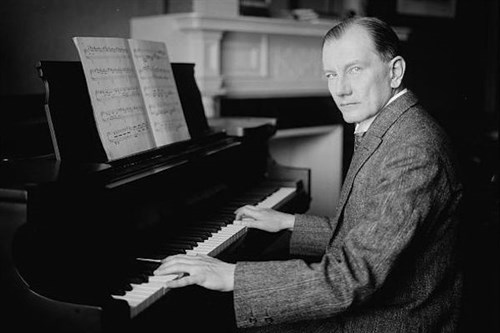Sydney Mozart Society
Affiliated with the Mozarteum, Salzburg
Sydney Mozart Society brings you Mozart and much more from the 'Golden Age' of Chamber music.

Spotlight on Ernö Dohnányi
One of the works in our Sydney Soloists concert on 2 August 2019 at The Concourse Chatswood is the Sextet in C, Op. 97 for piano, violin, viola, 'cello, clarinet and horn by Ernö Dohnányi, the Hungarian pianist, composer, teacher and conductor. Composed in 1935, the Sextet in C is an expressive work that shows Dohnányi's mastery of the grand Romantic style of the late nineteenth century and his embrace of the vibrant spirit of the early twentieth century.

Dohnányi was born in Pozsorny (now Bratislava) in 1877. He studied music in Poszorny and Budapest. At age 20 he won a prize for his first symphony composition and began establishing his reputation in Berlin and Vienna as a pianist of outstanding ability. Johannes Brahms admired the young Dohnányi, both as a performer and composer. Dohnányi performed extensively in Europe and America for many years. In 1919 he took up the post of Director of the Budapest Conservatory and later became the Director of Hungarian Radio. After the Second World War, he left Hungary and eventually settled in America, where he continued to perform, conduct and compose. He died in New York in 1960.
Dohnányi's music is finely crafted and melodic with rich textures and expression that owe much to Brahms. While he is regarded as more 'German' in style than his 'nationalist' contemporaries, Bartók and Kodály, at times the folk idioms of his Hungarian heritage can be heard in his compositions. The energy and rhythms of twentieth century modernism are also elements in his later works.
He is best known for several orchestral suites, including the Ruralia Hungarica Suite, the popular Variations on a Nursery Song for piano and orchestra, and the charming Serenade for string trio. After settling in America, Dohnányi developed an interest in American folk songs, incorporating several into another very popular work American Rhapsody for orchestra.
It is particularly pleasing for Sydney Mozart Society to feature an Ernö Dohnányi work in our August concert. In pre-WWII Hungary, one of Dohnányi's piano students was Bela Siki who would go on to enjoy a very successful performance career and to become one of the early patrons of Sydney Mozart Society.
Charmain Boyakovsky
Posted on Wednesday, 19 June 2019 at 7am
Society News
- 2026 Season
- Notice of AGM and Call for nominations - 2025
- 2025 Concert Season Details
- 2025 Season
- 2024 Season
- "A great concert" - and a chance to enjoy it again
- DATE CHANGE AND RENEWAL REMINDER
- Thank you, Seraphim Trio
- Thank you Flinders Quartet
- Thank you Frank Celata and Friends
- Concert details for Nov and Dec 2021
- Meet Daniel Herscovitch
- Meet Clemens Leske
- 2021 Concert Season Details
- Concerts Recommence - March and April 2021
- Cancellation of August and September concerts
- Postponement of April and May Concerts
- Meet Lloyd Van't Hoff
- Flinders Quartet, Shaping a Vibrant Music Future
- Beethoven, Out of This World
- Arts Engagement and Longevity
- A Message from the President
- Thank You Enigma Quartet
- Thank You Sophie and Kristian
- 2020 Concert Season Announcement
- Thank You Sydney Soloists
- Spotlight on Ernö Dohnányi
- Thank You Selby & Friends
- Seven Things To Know About The Seven Variations
- Thank You Goldner String Quartet
- Arthur Edward Smith, an Inspiring Life
- Thank You Australia Piano Quartet
- Music, Technology and Inclusion
- The Violins of 2018
- Thank You Streeton Trio
- Thank You Australian String Quartet
- Our New Patron - Dene Olding AM
- Thank You Australian Haydn Ensemble
- Just Announced - Our 2019 Concert Season
- Spotlight on The Australian Haydn Ensemble
- Thank You Seraphim Trio
- Seraphim Trio - Life Lessons from Music
- Spotlight on Ravel's Piano Trio in A Minor M 67
- Thank you AWO Chamber Ensemble
- There’s More to the AWO Than Performance
- Spotlight on the Brahms Clarinet Quintet
- Mozart's Irish Connection
- Thank You Flinders Quartet
- Mozart's Valentine
- Flinders Quartet Emerging Composers Project
- Thank You Enigma Quartet
- Thank You Southern Cross Soloists
- Thank You Duncan, Susan and Sue-Ellen
- The Magnificent Seven
- Spotlight on Beethoven's Septet
- Thank You Australia Piano Quartet
- The Remarkable Life of Richard Goldner
- Thank You Australian String Quartet
- A Winning Performance from the Verbrugghen Ensemble
- Meet Bridget O'Donnell
- Meet the Verbrugghen Ensemble
- Streeton Trio, What the Audience Said
- Selby and Friends, What The Audience Said
- Flinders Quartet, What the Audience Said
- Meet Zoe Knighton and the Flinders Quartet
- Seraphim Trio, What the Audience Said
- Meet Timothy Nankervis
- Thank You Selby and Friends
- Meet Helena Rathbone
- Meet Brenda Jones and the Shigeru Kawai
- Thank You Sophie and Kristian
- Meet Kristian Chong
- The Beautiful 'Cello
- Mozart and Friends, What the Audience Said
- Meet Peter Jenkin
- Sydney Soloists and Enigma Quartet, What the Audience Said
- Meet Marianne Broadfoot and the Enigma Quartet
- Goldner String Quartet, What the Audience Said
- Meet the Goldner String Quartet
- Southern Cross Soloists, What the Audience Said
- Meet Tania Frazer, Southern Cross Soloists
- Streeton Trio, What the Audience Said
- Chanterelle String Quartet, What the Audience Said
- Sydney Soloists, What the Audience Said
- Meet Julie Simonds
- Australian String Quartet
- Meet Penelope Mills
- Australia Ensemble, a Rich Musical History
- Meet Irina Morozova
- Meet Francesco Celata
- Meet Selby and Friends
- Meet the Diemen Quartet
- Remembering Razumovsky